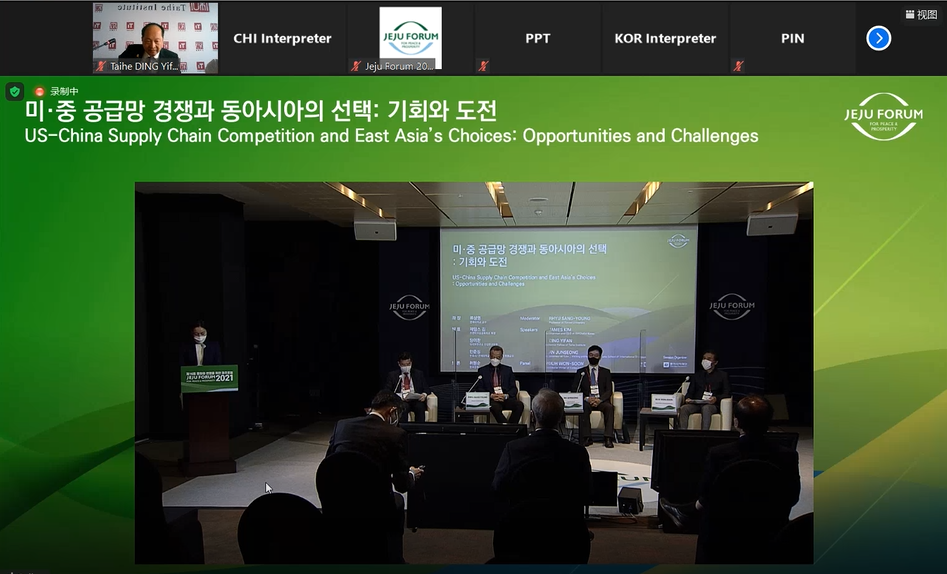On June 25, 2021, Ding Yifan, senior fellow at the Taihe Institute and former Vice Director of the World Development Institute, Development Research Center of the State Council, participated in the 2021 Jeju Forum “Sino-U.S. Supply Chain Competition and East Asian Choices: Opportunities and Challenges” Seminar.
The main points of Mr. Ding’s keynote address, entitled “What can be done to rebuild the Eastern Asian global supply chain?”, are as follows:
Currently, the Democratic and Republican political parties within the United States have reached a general “consensus” that China has become the “greatest threat to American sovereignty”. Although Joe Biden has reversed nearly all of the policies issued during the previous Trump Administration after he took office last January 20, policies against China have, for the most part, remain unchanged. While the Eastern Asian global supply chain was previously focused on the American and EU markets, what impact(s) would move these politically motivated efforts towards “decoupling” with China in the Eastern Asian global supply chain?
In the 1970s, union movements emerged in America and varied Western countries, empowering global industrial “clusters” to pivot into East Asia. Countries such as Japan and South Korea began building their industrial bases for the Eastern Asian global supply chain from scratch during the 1980s.
After the Plaza Accord, Japan set out to move its industries to other parts of East Asia, accelerating an in-depth development of the global supply chain in this region.
After the Asian financial crisis receded, China joined the World Trade Organization (WTO) in late 2001, gradually expanding its participation in and influence on the Eastern Asian global supply chain.
In the two decades since China ascended into full WTO membership, it has witnessed rapid economic development and grown into the largest supplier of the Eastern Asian global supply chain. In 2018, China’s industrial output almost matched that of the U.S., Japan and Germany combined as China continues to play an active role in East Asia in promoting regional cooperation and free trade agreements. However, this “rise of China” attracted concerns from not only America but many Western countries.
When it comes to the People’s Republic of China, the United States still holds fast to its predetermined “Cold War” mind-set, which seeks to hinder China’s development in varied sectors and triggering US-China Decoupling as the Americans attempt to deal with China the same way it did with the former Soviet Union during the Cold War.
There is no doubt that the “decoupling” of these two massive economies will hamper the development of the global supply chain in East Asia and may serve to set back the economic development of this global powerhouse region.
In the future, America may require companies in East Asia to choose sides between China and the United States.
Facts that might be neglected in this U.S.-led historic bifurcation include, but are not limited to:
-
China’s position in the global supply chain and its contributions to preventing global cost-push inflation;
-
China’s domestic market is the biggest consumer marketplace in the world;
-
The RCEP’s advancement will allow East Asia to better restructure the global supply chain and enhance this region’s competitiveness;
-
China’s dual circulation development strategy is expected to provide solid opportunities for Eastern Asian countries which, however, may face U.S. “long-arm jurisdiction”, and
-
Korean firms will be forced to choose between America and China.
In conclusion, the domestic political disturbance in Western countries have presented Eastern Asian countries with historical opportunities to participate in the global industrial chain. Eastern Asian companies need to take initiative and join hands with companies in the United States, Europe and other countries to lobby the Biden administration (and leading Democratic politicians) to change their position about the U.S. relationship (and dealings) with China.
The prosperity of the world economy should not, and will not, be achieved by isolating the People’s Republic of China.
—————————————————————
ON TIMES WE FOCUS.
Should you have any questions, please contact us at public@taiheglobal.org

